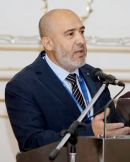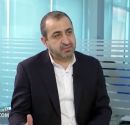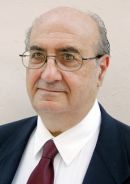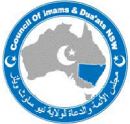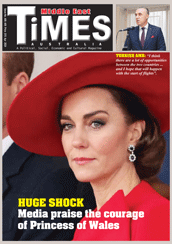| Middle East |
| Kuwait Declaration calls for bolstering pan-Arab ties, reaffirm support for Palestinian people |
Kuwait’s Amir opens Arab Summit with call to end disputes 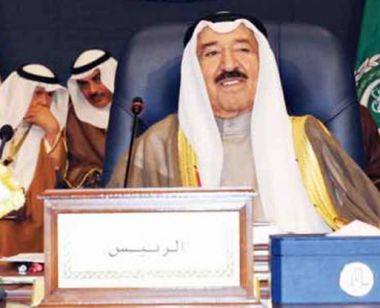 |
Kuwait Declaration calls for bolstering pan-Arab ties, reaffirm support for Palestinian people Kuwait’s Amir opens Arab Summit with call to end disputes Arab leaders meeting last month in Kuwait City have reiterated their commitment to the Arab League Charter and pan-Arab-Arab solidarity in the face of continuing tension in the Middle East. The two-day summit discusses a number of political, security and economic files, in addition to developments on the Palestinian front and the Syrian crisis, as well as what is related to promoting the Arab League’s system. The deliberations of the 25th regular Arab Summit held under the theme ‘Summit of Solidarity for a Better Future’ and it’s the first that Kuwait’s hosts since joining the pan-Arab organization in 1961. The Kuwait Declaration was issued at the end of the 25th Arab summit, chaired by His Highness the Amir Sheikh Sabah Al-Ahmad Al-Jaber Al-Sabah. The Kuwait Declaration agreed to: • Adopt constructive dialogue and transparency to end Arab rifts. support those countries witnessing political transformation and social shifts, including inancial and technical support. • bolster national security to ensure safety territorial integrity, and to confront challenges, internal and external. • reaffirm that the Palestinian cause remains the core issue for the Arab and Muslim nations, and to reiterate their commitment to work on the establishment of a Palestinian state with East Jerusalem as its capital according to the June 4, 1967, boundaries. The leaders also urged the United Nations Security Council to act quickly to resolve the conflict. • reject recognition of Israel as a state as well as new Israeli settlements in Palestinian territories. • Reaffirm their support for Syria to regain the Golan Heights as under the June 1967 borders. • Continue providing political and financial support to Lebanon to ensure that country’s national unity, security and stability. • Expressed support for the National Coalition of Revolution in Syria as the legitimate representative of the Syrian people. What the leaders said: Kuwait’s Amir HH the Kuwait’s Amir Sheikh Sabah Al-Ahmad Al-Sabah opened the Arab summit by urging the 22-member states to heal rifts and describing the Syrian conflict as the largest disaster in modern history. “It is sad that disputes have expanded in our Arab nation and are endangering our aspirations and ambitions,” Sheikh Sabah said. “We are required to resolve these disputes and seriously work toward unifying ranks … the dangers around us are too grave” Sheikh Sabah said. HH the Amir Sheikh Sabah expressed regret at widening disputes among Arab countries, saying the Syrian crisis was threatening international security. “We should address these differences and unite and to work together to overcome the disputes,” asserted HH the Amir. HH Sheikh Sabah cited a report by UNICEF which noted that the Syrian conflict forced displacement of 5.5 million children, three million children were not going to school and the mortality rate among children was the highest among any other conflict “in our present time. UN (Lakhdar Brahimi) Lakhdar Brahimi, on behalf of UN Secretary General Ban Ki-moon called for a stop in the supply of weapons to all parties in Syria while affirming that the Jewish settlement expansion was a violation of international law and undermined peaceful solution for the conflict. Brahimi, told the summit in Kuwait that the crisis in Syria, which broke out in March 2011 and killed some 140,000 people, was also a threat to the region. “The entire region is threatened to be included in this conflict, and Lebanon is particularly exposed to these dangers,” he said. “It is our responsibility to help end this tragedy.” He welcomed the unity of the international community in supporting stability and security of Lebanon. Arab League Arab League Secretary General Dr. Nabil Al-Araby hailed the influential role played by His Highness the Amir Sheikh Sabah Al-Ahmad Al-Jaber Al-Sabah in supporting the joint Arab. He expressed hope the logo of the summit ‘Solidarity for a Better Future’ be implemented decisively in order to confront challenges facing joint Arab action. Al-Araby said that some Arab disputes hampered a comprehensive solution, saying that such disputes can be resolved through inter-Arab co-operation. Qatar Qatari Emir Sheikh Tamim criticised Iraq’s Shiite-led government and Egyptian authorities in his address and renewed calls for a small Arab summit to resolve differences between Qatar-backed Hamas, which rules the Gaza Strip, and the Western-backed Fatah group in the West Bank. Sheikh Tamim hoped that stability in Egypt would be achieved through “a comprehensive dialogue” between the government and all parties. On Iraq, he said: “It’s about time for Iraq to emerge from the vicious circle of violence and differences. That cannot come about through the sidelining of entire society segments or accusing them of terrorism if they demand equality and inclusion,” Sheikh Tamim said. Saudi Arabia Saudi Crown Prince Salman bin Abdulaziz accused the international community of betraying Syrian rebels by failing to arm them against the regime of President Bashar Assad. “The legitimate Syrian resistance has been betrayed by the international community and left easy prey to tyrant forces,” the crown prince told the summit. “Syria has become a (battle) field open to killings and destruction carried out by an iniquitous regime with the participation of foreigners and armed terrorists who come from everywhere,” said the crown prince. He also called on the Arab League to speed up the handover of Syria’s seat in the 22-member organisation to the opposition National Coalition and cement its recognition by world powers. Jordan King Abdullah II of Jordan stressed that the Middle East is suffering from the failure to resolve its two biggest problems: the Palestinian cause and the Syrian crisis. He called for joint Arab action and stressed the importance of a Palestinian independent state to end the Palestinian-Israeli conflict and create permanent peace and security. On Syria, King Abdullah called for finding a swift and transitional political solution to end the suffering of the Syrian people and ensure they return home. Lebanon President Michel Suleiman demanded Arab nations share the burden of hosting Syrian refugees and to help protect his country from the turmoil in Syria. Suleiman emphasized on the necessity of hosting refugees in safe regions inside Syria, stressing that Lebanon cannot bear the refugees’ crisis on its territories. “The long-term negative consequences on Lebanon’s economy require many years of care and follow-up,” he noted. The influx of nearly one million Syrian refugees, according to UN figures, has swollen Lebanon’s population by 25 percent since the war broke out. The president also called on Arab nations to continue supporting Lebanon in all fields. “We also agreed on new policies to support the army and we welcome the exceptional Saudi donation to the military institution.” The United Nations forecasts that registered refugees in Lebanon could reach 1.5 million by the end of the year. Suleiman described the situation in Syria as the “worst misery since World War II.” Egypt Egypt’s military-installed interim president Adly Mansour called for Arab ministers to meet before the end of June to discuss implementation of an Arab counter-terrorism treaty. But he told the annual Arab League summit in Kuwait that it was vital that League members extradite and not give shelter to “terrorists” wanted by fellow member states. “We call on all Arab countries to stand united in confronting terrorism,” Mansour said. Bassil Foreign Affairs Minister Gebran Bassil affirmed Lebanon’s right to a resistance against Israeli aggression and occupation, warning that the country is in danger of becoming a conduit for jihadists worldwide as it faces the worst refugee crisis in modern times. Speaking at an Arab League summit in Cairo, Bassil appealed to Arab states to help Lebanon with the overwhelming number of Syrian refugees on its soil, and to assist the country combat terrorism by funding the Lebanese Army. Bassil also spoke about the danger posed by the rise of Jihadist groups in Lebanon, saying such a phenomenon threatened the entire Arab world. “The danger is not only that Lebanon is seeing a rise of epicenters of Jihadist thought, but that it could become a center to export jihad to the East and West,” he said. “What will become of the Arab world if its cultural door to the West, Lebanon, becomes passageway for those who seek to destroy all cultures?” Bassil added. He said terrorism in the region should be combatted with “enlightened Arab thought” and regional polices. Sheikh Salman commends journalists’ role in covering Kuwait’s Arab summit
Minister of Information Sheikh Salman Al-Sabah commended the role played by the Arab and western media in creating suitable atmospheres to bring about success of the 25th Arab summit. Sheikh Salman, also Minister of State for Youth Affairs, made the remarks during a dinner banquet held in honor of journalists covering the two-day summit. He conveyed the greetings of H.H the Amir Sheikh Sabah Al-Ahmad Al-Jaber Al-Sabah for the journalists. The summit was held under the theme “Solidarity for Better Future.” Sheikh Salman hoped the summit would succeed in honoring aspirations of the Arab people. |
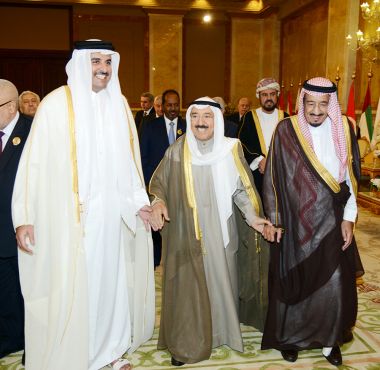 |
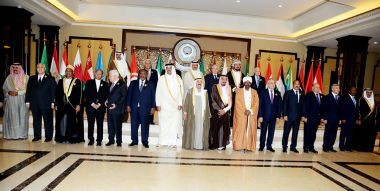 |
 |
 |
 |
 |
|
|
|||||||||
|
|||||||||
